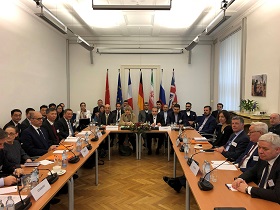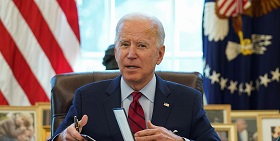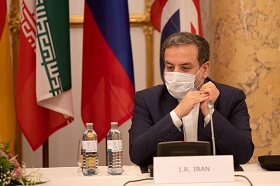The prospects for talks on an Iranian nuclear deal are becoming increasingly dim. After Democrat Joe Biden won the presidential election in the United States and was sworn in, Washington started to pursue a return to negotiating the JCPOA. However, the efforts of the diplomats did not bring visible results. For all appearances, the indefinite prolongation of the talks is not in the interests of the United States. From the point of view of the US State Department, the delay allows Iran to move even further in its military nuclear programme. However, getting back to the deal will be difficult. It will be even more difficult to keep it.
In theory, we could talk about synchronising the process of lifting sanctions and winding down the nuclear programme. But here, too, problems arise. What will be the parameters of such a synchronisation? And, most importantly, how is it possible to ensure that one of the parties does not break the new agreements?
For Iran, this issue is more important, if not existential. The resumption of US sanctions in 2018 led to the collapse of the Iranian economy. At least a partial lifting of the sanctions would be a breath of fresh air for the Iranian economy. On the other hand, the Iranians also perceive the nuclear programme in an existential way. Intervention by the United States and its allies is unlikely in the current environment. The possession of nuclear weapons can be seen as a factor that will make such an intervention simply impossible. Here, however, there may be another situation, when the appearance of nuclear weapons, on the contrary, provokes the United States, Israel and other regional players to pursue such an intervention. Apparently, Tehran understands this well and will use the nuclear theme energetically, but carefully.
For the United States, the situation looks very different. The prospect of Iran obtaining nuclear weapons may be unpleasant, but not fatal. Iran is just one of many items on the US foreign policy agenda. Acquiring nuclear weapons will strengthen Iran’s isolation. Moreover, it will be politically more difficult to give up nuclear weapons once they have been obtained.
The big question is whether Iran is ready for even more severe economic hardship? Answering this question is extremely difficult. Hardliners, for example, might argue that such tests are guaranteed anyway, until Iran surrenders on all fronts. Supporters of diplomacy may respond by combining the rate hike with the coalition game, seeking to isolate the United States under the JCPOA and exploiting loopholes in sanctions regimes.
The debate within the United States itself promises to be difficult. Biden cannot agree to the lifting of sanctions without the risk of serious losses of his political capital. In other words, Tehran’s requests are unacceptable for the US President. On the other hand, Biden can soften or modify those Trump decrees that he introduced after leaving the deal and which have seriously tightened sanctions.
However, even if a new deal is reached, its stability is not guaranteed. One of the reasons is that it is not easy to isolate the nuclear programme from the general package of contradictions between the United States and Iran. At one time, Obama tried to do this, and now Biden is following this path. Republicans and Trump, on the contrary, insisted on a package concept, where the nuclear programme is linked to other problems. These include the missile programme, human rights, the problem of terrorism and much more. The Democratic approach seems reasonable, because it is simply impossible to make progress on the entire package. The Republican approach makes sense as a means of raising rates and building up pressure. The competition between these two approaches is unlikely to end in the foreseeable future, hampering the stability of possible agreements.
The prospects for talks on an Iranian nuclear deal are becoming increasingly dim. After Democrat Joe Biden won the presidential election in the United States and was sworn in, Washington started to pursue a return to negotiating the JCPOA. The new administration aims to overcome the legacy of Donald Trump, who unilaterally broke the deal even though it was sealed by UN Security Council Resolution 2231 of 2015. In 2018, Trump renewed the unilateral US sanctions against Iran, and went on to tighten the restrictive measures even further. Eventually Iran also began to refuse the deal, resuming uranium enrichment to 20% in accordance with the law “On the strategic measures for the lifting of sanctions”.
In April 2021, the parties began indirect negotiations in Vienna, where a meeting of the signatories of the Joint Comprehensive Action Plan (JCPOA) took place. However, the efforts of the diplomats did not bring visible results. For all appearances, the indefinite prolongation of the talks is not in the interests of the United States. From the point of view of the US State Department, the delay allows Iran to move even further in its military nuclear programme. However, getting back to the deal will be difficult. It will be even more difficult to keep it.
The positions of Washington and Tehran on the deal are well known. Iran is demanding that the US first lift all sanctions that the US renewed or introduced in violation of UN Security Council Resolution 2231. After that, Iran will return to fulfilling its obligations. The United States, on the other hand, is demanding that Tehran first return to the deal, and say that only then will it be ready to consider the issue of sanctions. The mutual level of trust between the parties is practically zero. Trump’s demarche to withdraw from the JCPOA seriously undermined the US’s image as a reliable negotiator, not only in Iran, but even among America’s allies. The United States itself is also very suspicious towards Iran. In fact, the Republicans formed the basis of the opposition to Barack Obama’s efforts to conclude a JCPOA. Donald Trump simply brought his party’s position on the “bad deal” to its logical conclusion. It will be extremely difficult to bring the positions of the two countries closer together. In theory, we could talk about synchronising the process of lifting sanctions and winding down the nuclear programme. But here, too, problems arise. What will be the parameters of such a synchronisation? And, most importantly, how is it possible to ensure that one of the parties does not break the new agreements?
For Iran, this issue is more important, if not existential. The resumption of US sanctions in 2018 led to the collapse of the Iranian economy. One of the key factors is the ban on the purchase of Iranian oil. Moreover, the United States is successfully imposing its anti-Iranian sanctions on foreign countries, using secondary sanctions mechanisms and coercive measures. The same applies to oil transportation, the insurance of such transportation, as well as new financial and sectoral sanctions imposed by Trump. The situation has been aggravated by the COVID-19 epidemic. At least a partial lifting of the sanctions would be a breath of fresh air for the Iranian economy. On the other hand, the Iranians also perceive the nuclear programme in an existential way. Intervention by the United States and its allies is unlikely in the current environment. Its price will be high. Moreover, the United States is concentrating its forces on containing the PRC and Russia, curtailing “toxic assets” in the Middle East. But the possession of nuclear weapons can also be seen as a factor that will make such an intervention simply impossible. Here, however, there may be another situation, when the appearance of nuclear weapons, on the contrary, provokes the United States, Israel and other regional players to pursue such an intervention. Apparently, Tehran understands this well and will use the nuclear theme energetically, but carefully.
For the United States, the situation looks very different. The prospect of Iran obtaining nuclear weapons may be unpleasant, but not fatal. Iran is just one of many items on the US foreign policy agenda. Moreover, it can be used as a pretext for an even more radical build-up of sanctions, including the UN Security Council. Moscow and Beijing are also not eager to see Iran among the nuclear powers, although the blame for the Iranian nuclear efforts is being placed on Washington, and not without serious reasons. Acquiring nuclear weapons will strengthen Iran’s isolation. Moreover, it will be politically more difficult to give up nuclear weapons once they have been obtained. The big question is whether Iran is ready for even more severe economic hardship? Answering this question is extremely difficult. Hardliners, for example, might argue that such tests are guaranteed anyway, until Iran surrenders on all fronts. Supporters of diplomacy may respond by combining the rate hike with the coalition game, seeking to isolate the United States under the JCPOA and exploiting loopholes in sanctions regimes.
The debate within the United States itself promises to be difficult. On the surface it seems that the US president has the authority to lift sanctions immediately. President Trump resumed applying the restrictive measures by executive order. Such a decree can be cancelled or modified either by a new executive order or via a new law that could be passed by Congress. That is, technically, Biden has the authority to ease the sanctions on a large scale. However, in reality the situation is more complicated. In 2015, Congress passed the Iran Nuclear Agreement Review Act (INARA). In the event of a deal, the president is required to inform Congress every 90 days of its progress and certify that Iran is adhering to the terms of the deal. Obviously, under the current conditions, such certification in favour of Iran is simply impossible. This means that Biden cannot agree to the lifting of sanctions without the risk of serious losses of his political capital. In other words, Tehran’s requests are unacceptable for the US President.
On the other hand, Biden can soften or modify those Trump decrees that he introduced after leaving the deal and which have seriously tightened sanctions. US law does not provide for the president to be accountable for these decrees. So Congress is unlikely to be a major obstacle here. For example, Biden could soften or modify Trump's executive order 13902 of January 10, 2020, which imposed sectoral and blocking sanctions on the construction, mining, manufacturing, textile and other sectors of the Iranian economy. The same applies to executive order 13871 of May 9, 2019, which introduced sectoral and blocking sanctions on the production of iron, steel, aluminium and copper. In addition, Biden may well be using the sanctions exemptions imposed by numerous laws previously passed by Congress. In particular, in April 2019, Trump cancelled such exemptions for the import of Iranian oil for eight countries. Here the US President has a certain negotiation gap, which he can use to bargain with Iran.
However, even if a new deal is reached, its stability is not guaranteed. One of the reasons is that it is not easy to isolate the nuclear programme from the general package of contradictions between the United States and Iran. At one time, Obama tried to do this, and now Biden is following this path. Republicans and Trump, on the contrary, insisted on a package concept, where the nuclear programme is linked to other problems. These include the missile programme, human rights, the problem of terrorism and much more. The Democratic approach seems reasonable, because it is simply impossible to make progress on the entire package. The Republican approach makes sense as a means of raising rates and building up pressure. The competition between these two approaches is unlikely to end in the foreseeable future, hampering the stability of possible agreements.
First published in the Valdai Discussion Club.







